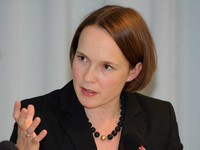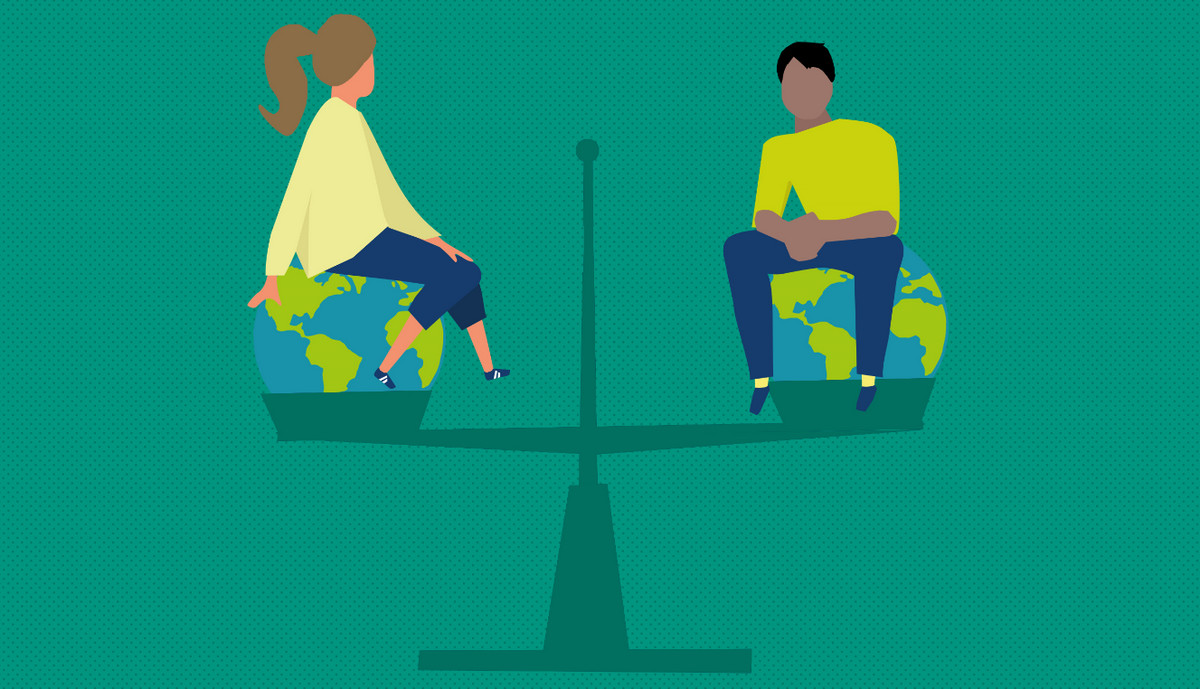Remark: the translation of this article in other languages has been carried out by an automated translation tool and is not an official translation. Errors may have occurred.
Europe’s (wo)man on the moon moment – the European Green Deal from a feminist perspective
Eva van de Rakt is the Director of the Heinrich Böll Foundation’s European Union Office and Lisa Tostado is Head of International Climate, Energy & Agriculture Policy Programme. Throughout their work and different perspectives they both contribute to gender equality by integrating it in various political debates, such as the one on the European Green Deal.
When European Commission President Ursula von der Leyen announced the European Green Deal at the end of 2019, she referred to it as “Europe’s man on the moon moment.” The new growth strategy is indeed ambitious, covering many policy areas, such as mobility, biodiversity, finance and industry. It aims to “transform the EU into a fair and prosperous society, with a modern, resource-efficient and competitive economy where there are no net emissions of greenhouse gases in 2050 and where economic growth is decoupled from resource use”. Our contribution looks at the gender dimension of this vast package of new initiatives. How can the European Green Deal become a (wo)man on the moon moment?
As the first woman taking over the most powerful EU job and as a former minister that had spoken out for increasing the number of childcare nurseries or for the introduction of a women’s quota, von der Leyen had faced high expectations on ensuring gender mainstreaming in the new Commission’s work. Her agenda for Europe, in which she claimed gender quality to be a priority, reinforced these expectations. It therefore comes as a worrisome surprise that there is a lack, even a mere absence, of gender analysis in the communication on the European Green Deal. Gender = zero search results.
However, it would be incorrect to state that nothing has happened in the field of gender equality ever since the von der Leyen Commission took office. In her Commission, women have a say and Equality Commissioner Helena Dalli is ambitious. She presented the EU’s first ever Gender Equality Strategy in March 2020, just a few months after the communication on the European Green Deal. The Strategy lays out strategic objectives for combatting gender-based discrimination in the fields of gender-based violence, the gender pay gap, gender balance on company boards and work-life balance. While these are important signals, the link to the European Green Deal, the centrepiece of the von der Leyen Commission, is unfortunately lacking. The Commission, it seems, simply does not connect the dots. It missed an opportunity to tackle two major issues in the EU. A Eurostat Report from June 2020 shows that while making at least some progress on the Sustainable Development Goals (SDGs) in most areas, the European Union is in fact going backwards on key aspects of gender equality (for instance on the gender employment gap) and has stagnated on climate action in the past five years.
The example of climate and gender policies demonstrates the need and benefits of linking them instead of planning and implementing them in silos. All aspects of climate change also have a gender dimension. To name just a few examples: Individual carbon footprints vary according to factors in which differences between men and women exist, such as income, mobility and lifestyle characteristics. When designing policies to incentivise individual consumption and behaviour patterns to become more sustainable, decision-makers must consequently consider the gender aspects and implications. New taxes or regulations can also have gender-differentiated effects. For example, in Germany, female-headed households are affected almost twice as much by energy poverty as male-headed households, which needs to be considered when raising energy prices. Furthermore, recent research suggests that political empowerment of women is associated with more ambitious climate policies.
The narrative framing of the “just transition” is an example of how European Green Deal initiatives could step-up gender mainstreaming. The first thing that pops into most people’s minds when confronted with ”just transition” are male coal workers. It is not enough, though, to understand the “just transition” as a concept looking at male employed workers only, in particular in high-emitting industries. Surely, creating and preserving jobs in regions heavily impacted by the energy transition is an important tool. However, promoting the expansion of low-carbon jobs for men and women, e.g. in the digital and service sector, as part of a decarbonisation plan is just as important, both from an ecological and a social standpoint. Delivering just outcomes for all also means paying more attention to care work, which is exceptionally relevant during the on-going health crisis.
The Covid-19 pandemic has increased the risk of backlash with respect to gender equality. In an economic crisis, workers with part-time or any forms of precarious contracts (not to speak of workers without any official contract), are most at risk of facing severe budget cuts. This will most probably affect more women than men. Much of the additional unpaid care work falls on women. Men without paid parental leave or other measures to help juggling family and work life (still uncommon in many EU Member States) have also suffered since the start of the pandemic.
Against this background, it is now crucial to use gender analysis when implementing the European Green Deal and when designing recovery policies. One milestone will be the next EU Multiannual Financial Framework (MFF), together with Next Generation EU (NGEU), the EU’s recovery plan. With respect to gender equality aspects, a resolution of the European Parliament of 22 July 2020 gives reason for hope for improvements. In this resolution, there is a section demanding the introduction of gender mainstreaming and gender impact obligations (gender budgeting) both in the MFF and in the NGEU. The European Parliament has made clear that it will not rubber-stamp a fait accompli and is prepared to withhold its consent for the MFF until a satisfactory agreement is reached in the upcoming negotiations with the EU Council.
Another important tool will be the abovementioned EU Gender Equality Strategy – not just as a communication, but resulting in concrete plans for its implementation. The Commission had published it just before lockdowns began, with the risk for it to be shelved during the Covid-19 crisis. If a new policy is gender-blind, particularly one as vast as the European Green Deal, it likely invests and enforces existing inequalities. Efforts to improve gender equality must therefore not only complement the European Green Deal – they must be an integral part of it. In order to succeed with a European green transition, it is of utmost importance that all citizens are on board. Feminist, climate, workers’ rights and other transformational movements have to come together and create synergies. It is time for Europe’s woman on the moon moment!
About the Authors

Eva van de Rakt has been Director of the Heinrich Böll Foundation’s European Union Office in Brussels since 2019. She has worked for the Heinrich Böll Foundation since 2001. As Director of the Prague Office she was responsible for the Foundation’s activities in the Czech Republic, Slovakia and Hungary from 2004 until 2018. She was a Member of the Board of Directors at the Green European Foundation from 2014 until 2016, and is currently Member of its General Assembly. Since 2018, she has been a Member of the Board of Directors at the Czech-German Fund for the Future (Deutsch-Tschechischer Zukunftsfonds). She completed her studies at the University of Music and Theatre in Rotterdam.
Credit photo: Stephan Röhl – All rights reserved

Lisa Tostado has been Head of International Climate, Energy & Agriculture Policy Programme at the European Union office of the Heinrich-Böll-Stiftung in Brussels since November 2019. As such, she is responsible for issues related to coherence of EU policies for sustainable development, especially with respect to their impact on developing and emerging countries. Before joining the Heinrich-Böll-Stiftung, she worked as a project manager in the circular economy sector in France where her main focus was reusable and recyclable food packaging. Lisa also gained experience in international development cooperation at the Deutsche Gesellschaft für Internationale Zusammenarbeit (GIZ) where she focused on topics related to the adaptation to climate change impacts. Lisa holds a BA in Political Sciences and Economics from the University of Mannheim and the University of Ottawa, and a MA in Environmental Policy from Sciences Po Paris and the University of Liège.
Credit photo: Nora Weis – All rights reserved
Credit Cover illustration: Pia Danner Licence: CC-BY-NC-SA 4.0

